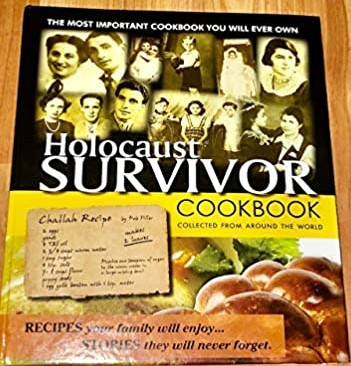Holocaust Survivor Cookbook
Holocaust Survivor Cookbook; Collected From Around the World
By Joanne Caras
Amazon, January 1, 2007
Reviewed
Holocaust Survivor Cookbook might not be the most tasteful title you have ever heard; but hold your criticism of this astonishing compendium of recipes and stories until you know the background. In 2005, Sara and Jonathan Caras, a young, newly married American couple, made aliyah to Jerusalem where they both volunteered at the Carmei Ha'ir Soup Kitchen. When their two mothers visited later that year, they were struck by the dignity and impressiveness of the place. Joanne Caras decided to raise money for the project in America, by producing a cookbook of great Jewish recipes. Soon afterwards Sara's grandmother died, and Joanne was moved by the beautiful tribute Sara's mom, Gisela, wrote about her mother, a Holocaust survivor. And so the idea for the cookbook was born - a collection of recipes from the families of Holocaust survivors, together with their stories.
The book is dedicated to survivor Abe Malnik, who passed away just prior to its publication. It is also dedicated to the six million Jews who did not survive the Holocaust, some of whom are lovingly remembered in the stories. It is almost unbearably poignant that the money from these stories and recipes is going to subsidize food for the hungry in Jerusalem. The lack of food, and dreaming about it, was one of the central aspects of life during the Holocaust. Lillian Berliner, a survivor who today lives in New York, recalls: "We were starved in Auschwitz, and to alleviate our numerous hunger pains, we invented frequent "dream meals" ranging between coffee klatches, luncheons, informal and formal dinner parties. This may sound delusional I know, but during these meal planning sessions, we were briefly transported to a normal world, a world that was so far from our miserable reality."
Laura Frajnd, who now lives in Sweden, was almost 18 when the train stopped at Auschwitz. "I could not cook and had never shown any interest for the kitchen and its activities," she says. "But there, in the camps we were suffering from hunger and we talked a lot about food. These conversations were my introduction to the art of cooking.
Ruth Steinfeld, from Texas, admits that she had no idea even how to make a good soup. "I do not remember exactly what my mother looked like," she says, "but I remembered the smell of her chicken soup. I worked on it till I felt I had my Mom in the kitchen. Opening to a random page I found Regina Weisz Wolovits' Paprikash Potatoes, submitted by the survivor's daughter. Her story is a tale from hell: the murder of parents and family, surviving unimaginable deprivation in a series of camps like Bergen Belsen, where she woke one morning to find a dead rat serving as her pillow.
The stories end with liberation and building new lives in Israel, North and South America, Canada, New Zealand, Europe, Australia and South Africa; there are pictures of survivors from pre-war Europe and then today, surrounded by friends and family. The cookbook bursts with stories of aching loss and startling rehabilitation after the War, culminating in the establishment of new families with children and grandchildren and great-grandchildren. It is a tribute to the resilience of the human spirit, and of Jewish survival.
The compilers of the book ask you to serve the recipes from the book together with their stories, to keep both alive for generations to come. As the cover of the book proclaims, this is the most important cookbook you will ever own. And as for the recipes themselves: chopped liver, chicken soup and cholent are all there, together with the more esoteric Pfannkuchen (German pancakes) and Schipyeh (radishes, scallions and cottage cheese, for those who don't know Polish). And if you recognize a survivor through their stories and recipes there is an email address to facilitate contact.
The book costs $36 - pa'amayim chai - or twice eighteen, the Hebrew gematria for "life." Rush to buy your copy.








Comments